But back to Russia. In giving the finger to his Western Partners and breaking Russia’s diplomatic isolation at the Genoa Conference by signing the Treaty of Rapallo, Lenin had expended the last of his strength. In May 1922, he had a stroke. It was the first time that the issue of his successor came up. In fact, Lenin had not picked anyone to replace him, and after his first stroke, he was not fully able to run the country. Thus began the struggle for Lenin’s legacy between Trotsky and Stalin.
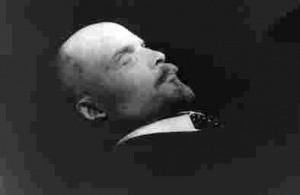 Everyone in the Soviet Union knew the date of Lenin’s death: January 21, 1924. But, almost no one remembers another date that is no less important in understanding the origins of fascism. The English waited until Lenin died, and only then did they recognize the Soviet Union. The leaders of Britain had no problem with communism, they simply did not want to work with the man they had sent to destroy the country and surrender it to Western control. Lenin took care of the former, but not the latter. And, in Genoa he had proved that he could pull of diplomatic feats as cleverly as his British «friends.» Of course, matters such as establishing diplomatic relations aren’t accomplished in a week. Consultations were active already before the leader’s death, and when Britain recognized the USSR nine days after Lenin’s passing, it was sending a direct and unambiguous signal of which political course would receive the most understanding. Lenin’s departure gave an excellent opportunity to correct the problems caused by his sharp cunning. And there to correct the problem was Trotsky, on whom the Anglo-Saxons placed their hopes.
Everyone in the Soviet Union knew the date of Lenin’s death: January 21, 1924. But, almost no one remembers another date that is no less important in understanding the origins of fascism. The English waited until Lenin died, and only then did they recognize the Soviet Union. The leaders of Britain had no problem with communism, they simply did not want to work with the man they had sent to destroy the country and surrender it to Western control. Lenin took care of the former, but not the latter. And, in Genoa he had proved that he could pull of diplomatic feats as cleverly as his British «friends.» Of course, matters such as establishing diplomatic relations aren’t accomplished in a week. Consultations were active already before the leader’s death, and when Britain recognized the USSR nine days after Lenin’s passing, it was sending a direct and unambiguous signal of which political course would receive the most understanding. Lenin’s departure gave an excellent opportunity to correct the problems caused by his sharp cunning. And there to correct the problem was Trotsky, on whom the Anglo-Saxons placed their hopes.
Now let us return to the ideological differences between Joseph Stalin and Leon Trotsky – between the theory of creating a socialist state and the fundamental inability to do so. What does it mean to create a new social order? It means struggle, blood, civil war, death, and devastation. On that point, Trotsky and Stalin more or less agreed. But, once the battle was over, it was time rebuild the country, and that is where the disagreements began. Stalin believed that it was necessary to focus on establishing socialism in the USSR, and, to that end, to build new factories, plants, railroads. Socialism should improve the life of the working man, and that meant building kindergartens, schools, libraries, fighting illiteracy and ignorance, investing in infrastructure improvements, building resorts and summer homes for workers – not only to restore Russia, but also to develop and improve it.
What did Trotsky suggest? Socialism in a single separate Russia was impossible. Therefore, large-scale construction was meaningless. What’s the use of building a ceiling without laying the foundation? And the only foundation for a better life in Russia could be a worldwide revolution. That was the task at hand, and only afterwards should the rest have been dealt with. That meant there was no need for resorts or kindergartens, nor plants and factories. There was no need for anything, really, other than financing for revolutionary movements around the world and the creation of a strong army that could bring about the dawn of mankind by the tips of its swords. Trotsky’s permanent revolution had to be permanently exported. What does that mean? That meant that at any moment the USSR might attack a random country at Comrade Trotsky’s discretion – him and his foreign friends to whom Leon sent the «locomotive» money.
It was hardly an innocuous situation. If Trotsky had won, then all the forces of the country would have been used to menace the outside world. In that case, Comrade Trotsky would have given his British and American patrons an extraordinary opportunity to achieve the destruction of the Soviet Union by military force. Who would denounce Western aggression if the USSR itself were preparing to attack? No one, of course, everyone would applaud. In addition, the theory of exporting revolution allowed Britain to create tensions in opportune places with the blood of Russian soldiers. The Persian Shah does not want to give the British their oil? Then the Red Army can come to stir revolution, set the place ablaze and then fluffy White Brits would arrive to save the Persians from the savage communists. And, as a token of gratitude, they’d take the oil themselves.
The first big clash between Stalin and Trotsky occurred in January 1923 over the aforementioned occupation of the Ruhr. Trotsky called for Russia to support the communists who, as we recall, mounted an uprising in Hamburg in October 1923. That meant sacrificing friendship with Germany in the name of the ideas of world revolution – and friendship with Germany means more than just banquets, handshakes and smiles between diplomats. It means tools, machines, turbines, and lenses that only Germany can make, and that the Soviet Union desperately needed. Stalin was categorically against intervening, and no intervention occurred.
In January 1924, Lenin died and the struggle for power in Russia was out in the open. At the time, it as unclear who would win, but it was likely that crushing Russia would require another war. For that, the Anglo-Saxons would need a government to start it, and that government would need the appropriate leader.
The trial of the Nazi coup took place in February-March 1924. Hitler was sentenced to five years in prison. Wasting no time, he began to dictate his future book, Mien Kampf, to Rudolf Hesse. In it, as we remember, he relentlessly extolled the benefits of an Anglo-German alliance for both countries. Are you not shocked? He should have been sitting in a cell becoming reformed, not writing a book! But, for the Fuhrer, prison was like a resort – good food, regular visiting hours: six hours a day.
A regime of preferential treatment for Hitler was installed in the prison. «The penitentiary looked like a delicatessen. You open a flower, fruit and wine shop with the inventory crammed in that cell,» as Ernst Hanfstaengl described the Fuhrer’s «slave pen». [Hanfstaengl: “Hitler: The lost years”] Speaking of which, the American went to see him there, and not out of sentimentality. He was there to once again drag Hitler out of a tough situation. The manuscript of Hitler’s «masterpiece» had been secretly whisked out of prison and was already readied at the Volkischer Beobachter printing house, but the Nazi printer had a lot of unpaid bills. If they were not paid off, all would have been lost.
“I have paid some of them and acknowledged the others, and that was enough to keep the paper afloat,”[Ibid] Hitler’s guardian angel wrote in his memoirs. Most of the pro-British ideas in the book belonged to Hanfstaengl anyway, so it would have been a shame if it never saw the light of day. And it wouldn’t take too much money, so why not. And instead of five years in prison, Hitler served only thirteen months [from November 12, 1923 to December 20, 1924]! The required help was small, but crucial …
Hitler was released and then a financial miracle occurred. It would be later that Hitler would miraculously lift the German economy, but first the first «miracle» happened to him personally. The finished manuscript of his book, Four Years of Struggle against Lies, Stupidity and Cowardice, appeared in print under a new title – Mein Kampf (My Struggle). Its circulation was relatively small, and reader interest even smaller. In 1926, he released the second edition of Mein Kampf, but it was essentially the same. The first edition sold 10,000 copies in 1925, and about 7,000 were sold in 1926. In 1927, both editions found only 5,607 buyers, and in 1928, even less – only 3,015. [Joachim C. Fest’s ” Hitler”]
It is clear that a writer could not live off of such «sales» as it is now customary to say. But Adolf Hitler, the young «writer,» was living pretty well. It seems he had no other income, but that fact did not stop him from leading a carefree life. Just six months after being released from prison, he lived once again in his old apartment in Munich, but by the summer of 1925, he rented and then bought a villa in the Bavarian Alps – the famous future Obersalzberg. In addition, he bought himself the latest model six-seat (!) Mercedes Kompressor, something the average scribe cannot afford these days, let alone at a time in Germany when it was an extremely costly purchase [Ibid]. Hitler’s lifestyle also acquired the glossiness appropriate for a Fuhrer: nice clothes, spare money, a car and chauffer. The Weimar tax police were extremely interested in Hitler’s unknown income sources that allowed him to live large fresh from his prison bunk. Responding to the tax inspectors, Hitler said «neither in 1924, nor in the first quarter of 1925 did I receive any income. My living expenses are covered by loans I have taken from the bank – the same source of the money I used to purchase an automobile.»
Hitler’s correspondence with the tax authorities tells a different story. «I limit my personal needs down to the necessities, not taking alcohol or tobacco at all, eating in the most modest restaurants, and, except for miniscule rent, I do not carry any expenses as a writer and publicist…»[Ibid] Writer Adolf Hitler responded to the tax inspectors. Indeed, in the «profession» column, he wrote only «writer,» and all that was indicated in his income tax returns was «writer,» with income from book sales. But credit alone would not settle the tallies: his costs greatly exceeded his revenue, which is why the inspectors were asking questions. In his explanations, the Fuhrer cited loans that he took out for his purchases. However, it remains unclear to this day how he repayed them all.
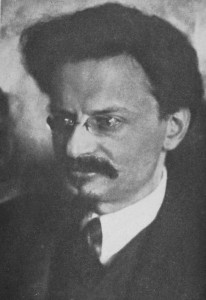 December 10, 1928, Trotsky was exiled to the distant city of Verni (now Almaty, Kazakhstan). He traveled with all the amenities: a private wagon was made available for him to travel with members of his, his assembled personal archive, library and everything else he needed (including a dog and hunting tackle).
December 10, 1928, Trotsky was exiled to the distant city of Verni (now Almaty, Kazakhstan). He traveled with all the amenities: a private wagon was made available for him to travel with members of his, his assembled personal archive, library and everything else he needed (including a dog and hunting tackle).
Of course, life for the leader of the failed world revolution turned much worse in exile. But for Hitler and the Nazis, the year of Trotsky’s expulsion became, conversely, the start of the party’s unprecedented growth. «Hitler’s success and his doctrine can be tracked in this sense. In 1928, he possessed a total of 12 seats in the Reichstag. In 1930, this figure had grown to 107, and in 1932 – 230.» [W.Churchill “World War II”]
The Nazi Party rose sharply, becoming the main nationalist force, still in the south of the country, absorbing a multitude of small unions and nationalist groups. Then it began growing at the national level. In 1927 (still before Trotsky’s exile), one account illustrated an extremely unflattering portrait of the Storm troopers after a march: «they were dressed in cheap, shabby uniforms, and truck that hauled them in was no better than an antiquated jalopy.» [Desmond Seward: :Napoleon and Hitler”]
How interconnected this world is! Sometimes it’s simply incredible! Who would have thought that as soon as Leon Trotsky was sent to Almaty that the quality of uniforms and allowances for the Fascist Storm troopers would skyrocket? You don’t believe this coincidence? Then try to find an unflattering description of one of their marches from 1928!
However, the true tipping point, after which Hitler rapidly and unrestrained surged to the top in Germany occurred in the first third of 1929. Again, for the umpteenth time the movement went under a fortunate metamorphosis, beginning, as usual, with the Fuhrer himself. In 1929, his biographers write that his tax return miraculously disappeared, still claiming «interest on loans.» [Joachim C. Fest’s ” Hitler”] There had been a real financial miracle, and Hitler was no longer in debt! At the same time, he again moved and lived in a nine-room apartment on Prinzregentenstrasse, a wealthy bourgeois neighborhood in Munich[Ibid]. He had a large entourage: aides, bodyguards, chauffeurs, cooks, and even gardeners.
Hitler looking over his Storm trooper brigade in Nuremburg 1927. Comrade Trotsky had not yet been expelled from the Soviet Union and had not yet even been exiled to Almaty. At the time, Leon Trotsky was continuing his struggle for power and so the Storm troopers’ uniforms left much to be desired. The Nazis still had not received funding, but it would rain gold immediately after Trotsky’s exile.
But at the very beginning of 1929, the deputy head of the Nazi Party, Rudolf Hesse personally traveled to Germany throughout Germany raising money. He handed out two packets of photographs to German industrialists; one displaying communist demonstrations, the other showed Storm trooper marches. The message in text that accompanied them was simple: these are forces of destruction; we are the forces of order. But the Storm troopers were poor, in need of uniforms and gear – in a word, money. The haves should give to the have-nots, or risk losing it all.
Hitler himself greatly reduced his activities. «If in 1927 he spoke publicly 56 times, then two years later he reduced his speaking engagements to 29.» [Joachim C. Fest’s ” Hitler”] Tired? No, at that point other means could achieve the necessary promotional results and there was no need to strain his voice at rallies. Hitler was now campaigning for money and newspapers – not the Nazi press. For some reason, in 1929, media mogul Alfred Hugenberg created an alliance with Hitler. The official reason was to stand together against the Jung’s plan called «Germany’s rebirth.» The real reason was to raise the scope of Hitler’s message. Hitler was discussed on the radio, and a huge number of Germans learned of the Nazis and their irrepressible leader for the first time. Hitler had so much PR that the number of his followers would multiply by seven in two years [On May 20, 1928 Nazis got 2,6%, on September 14, 1930 – 18,3% of votes].
But as recently as 1928, funding shortages had lead Hitler to cancel the party congress to be held that year in Munich — he needed to save for Storm trooper uniforms, so no grand forum! Historians have an explanation ready: owing to «a rebel sentiment in the party.» [Joachim C. Fest’s ” Hitler”] But we all know that reducing allowances is the best way to breed grumbling discontent. With money, all of the party’s internal problems could be resolved. But Hitler had no money; he invested it all in the upcoming parliamentary campaign[Ibid].
Invested and lost: May 20, 1928 the Nazi Party received only 2.6 percent of the vote and was left in ninth place. Who would sponsor such political outsiders? Only those who needed them. And suddenly in Nuremberg August 3-4, 1929, the Nazi Party’s held the grandiose convention in its history. Thirty specially commissioned trains transported 200,000 party members to the city. [Alan Bullock: ‘Hitler and Stalin: Parallel Lives’] Sixty thousand Storm troopers marched before the Fuhrer. And this was done by a political organization that in the summer of 1928 was broke and lost elections? What kind of fairy godmother was helping the Nazis?
The sorceresses name was … British, American and French intelligence — almost the entire future «anti-Hitler coalition,» which was nearly driven to its grave by the terrible beast it fed. Judging by the dates we have before us, these organizations performed this particular financial «miracle» in the interval between early and mid-1929. We have already seen that Hitler always receiving funding only when events in the Soviet Union were not going according to the West’s plans. What was going on there during this period?
On February 10, 1929, Trotsky was expelled from the USSR.
In mid-December 1928, the commissioner of the State Political Directorate went to Trotsky from Moscow and told him to cease leading the opposition or discussions about his expulsion would follow. Trotsky refused and went into exile, first to Turkey in the Prince’s Islands in the Sea of Marmara. There he immediately began to print the Bulletin of the Opposition, wrote his autobiography «My Life,» which, incidentally, praised Hitler. There he also wrote the «History of Russian Revolution» and other works, which desperately scolded the country (USSR) he had helped to create, which was now out of control. In 1933, he moved to France, in 1935 – to Norway, and everywhere he went he was constantly writing something, always printing something [The Bulletin of the Opposition had been issuing for 12 years: from 1929 to 1941].
With what means? Kickbacks from the «locomotive» deal? Or was someone supporting him? But who needs a man who started a revolution only to become spent fuel? The same people that were supplying him with cash from 1905 to 1917! Trotsky’s family and he himself have never known financial hardship – their assets appeared from nowhere all by themselves. Curiously, Trotsky, the fiery revolutionary had no difficulties obtaining visas to the countries of the bourgeois democracy. Why, do you say, would the French welcome the champion of permanent revolution?
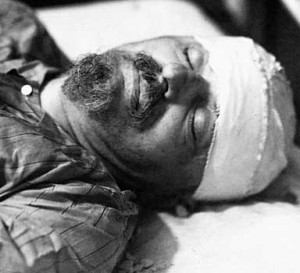 At the end of 1936, Trotsky moved to Mexico, where he lived up until April 20, 1940 when Spanish revolutionary and NKVD agent Raul Mercader killed him with an ice pick…
At the end of 1936, Trotsky moved to Mexico, where he lived up until April 20, 1940 when Spanish revolutionary and NKVD agent Raul Mercader killed him with an ice pick…
«Without Stalin, there would have never been Hitler,» Trotsky wrote.
Right, Leon Trotsky, absolutely right. Only the meaning of the worlds «devil of the world revolution» is not at all what historians understood it to be. Stalin did not give Hitler any money, did not provide him any support in his ascent and did not have any contacts with the Nazis until they had formal authority in Germany.
Stalin made Hitler necessary and urgent by destroying Trotskyism and expelling Trotsky from the Soviet Union, allowing it to take a different course of development from the one imposed on us by Britain and its allies! If Trotsky had triumphed in the USSR, he would have given away the country without struggle. Why else would Germany end up with a leader like Adolf the madman?
It is time to tell the truth: Stalin did not create Hitler, nor did German industrialists; rather it was the Russia’s perennial geopolitical rivals.
They prepared World War II to correct an error made in 1917. To do this, they needed Adolf Hitler.
And that is why no one could stop him.
ORIENTAL REVIEW has concluded the series of exclusive translations of the chapters from Nikolay Starikov’s documentary research ““Who Made Hitler Attack Stalin” (St.Petersburg, 2008).
PREVIOUS EPISODES
Episode 5. Who paid for World War II?
Episode 4. Who ignited First World War?
Episode 3. Assassination in Sarajevo
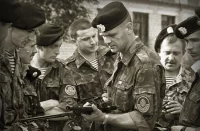

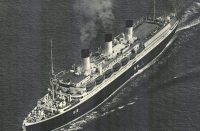
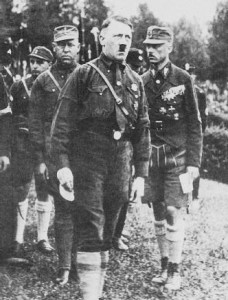











“Wasting no time, [Hitler] began to dictate his future book, ‘Mein Kampf’, to Rudolf Hess.”
Geopolitician Karl Haushofer was the mentor of Rudolf Hess, and is likely one of the ghost writers involved in the production of ‘Mein Kampf’ to which, per historian David Irving, their Fuhrer did not creatively contribute.
With the possible exception of Homer Lea’s approach, all geopolitics, as developed from the 19th century onward, is geared toward one goal: Jewish attainment of hegemony over the “Pivot of History”, the “Prize” in the “Great Game” — the Rump of Russia!
This is the land of their ancient Khazaria, from which these Jews intend to rule again. It is their true target. Their Eretz Yisroel scheme is simply a useful sideshow.
RESIST !!!
Pingback: L’Europe d’une guerre à l’autre (VI – 5) – Léon Trotsky, père du nazisme allemand | Réseau International
Pingback: Valete trotskista belicista, Fernanda Câncio feminista, Mário Machado racista, e a Nova Ordem Social e Mundial Zionista! Estão todos juntos a fazer oposição controlada psicanalista! – O diário de um ET